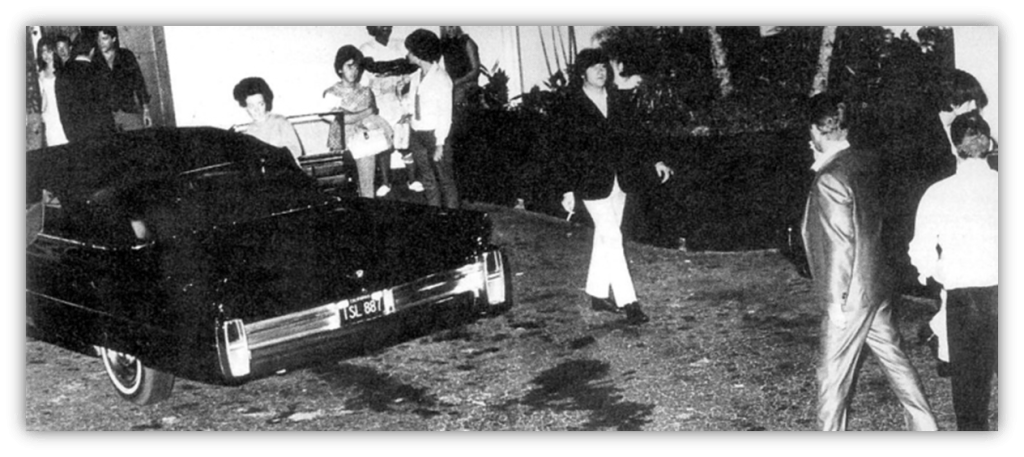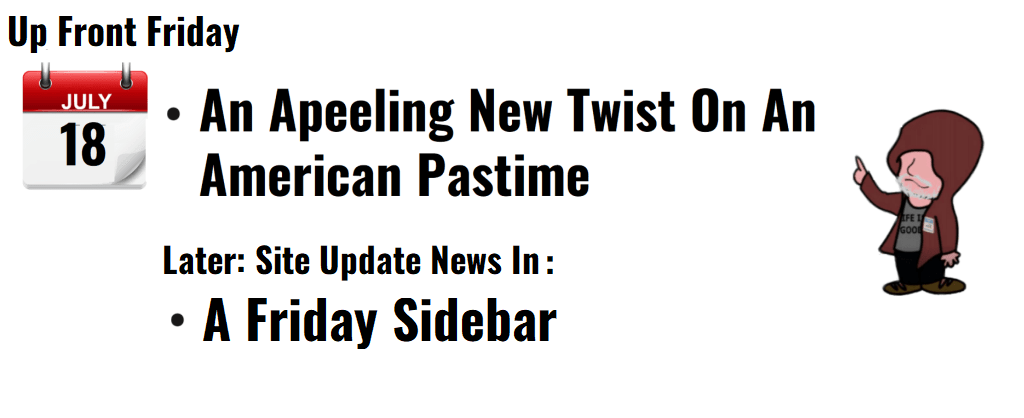There’s a saying:
“You should never meet your heroes: they might not live up to your lofty expectations.”
After reading Living The Beatles Legend by Kenneth Womack, I’d consider extending that to reading their biographies.

OK, so hero is a stretch for Mal Evans. But as a longtime Beatles fan I’ve been aware of him since my early teens when I read Hunter Davies 1968 biography of the band.
Mal has featured in plenty more books / podcasts / documentaries since, expanding my understanding of his role in the their story. Then there was Peter Jackson’s Get Back.
Mal is always there, providing whatever they need.

No request is too outlandish and most impressively of all, when Paul decides a hammer isn’t sufficient for Maxwell it doesn’t take Mal long to rustle up an anvil.
In the centre of swinging London I’d imagine blacksmiths were in short supply, but it’s no problem for Mal.
Everything I’ve ever heard about him has followed the same theme. A gentle giant, a lovely man who would do anything for anyone but especially so if its John, Paul, George or Ringo. Which made it even more jarring knowing the circumstances of his death; shot dead in 1976 by the Los Angeles police.
Living The Beatles Legend has its basis in Mal’s diaries and a manuscript he worked on in the year before his death, giving his and The Beatles story from the inside. Always room for another side to the story.
Only, the story of Mal doesn’t spare the darker side.
It has a foreword by Mal’s son Gary who quotes Ringo’s advice on Mal writing his memoir.

“If you don’t tell the truth, don’t bother doing it.”
Gary acknowledges the special feeling fans have towards his father. And although also calling him his hero, he admits that the portrayal comes with ‘warts and all’.
Everything I’d heard is true. He was that gentle giant, the guy who could provide whatever was required at a moments notice. He was big but he disarmed people with his friendliness rather than intimidation.
Virtually everyone who he comes across has good things to say about him.

He was there when The Beatles met Elvis.
In fact, the only musical artist he revered more than The Beatles was The King. While there are varying accounts of how enamoured Elvis was with the Beatles, Mal must have made a positive impression as in 1971, Elvis phoned to wish Mal a happy Easter.
Some of the positive comments on Mal’s attributes do display an element of the backhanded compliment. Making clear that however good he was at his job, that was the limit of abilities. There are constant comparisons between Mal and Neil Aspinall.

They both started as roadies. But whereas Neil ascends to heading up Apple Corps, Mal struggles to break out of his role – even if his title progresses to the more professional sounding “Road Manager.”
By the mid 70s Mal is still performing the same role: Seeing to the needs of John, George and Ringo, whether personal or in the studio. Paul is the odd one out, telling Mal shortly after the break up that he no longer needs him.
Which brings us onto the major flaw in Mal’s character:
He idolises the Beatles, from the very beginning in The Cavern and all the way to the end. The break up and Paul’s dismissal hits him hard. His self worth seems wrapped up in how they see him. It’s clear there is genuine affection both ways but tempered by the fact Mal is in their employ. They’re extremely generous to him at times, but at others he is put in his place by the hierarchy.
The worst example comes when Mal helps Paul finish the lyrics to “Here, There And Everywhere.”

In Mal’s telling Paul says he’ll get a writing credit, which is later rescinded as it would affect the clarity of the Lennon & McCartney partnership but with the assurance he’ll still get the royalties. In the end he doesn’t get them either.
Even when he gets knocked back, he finds ways to justify his treatment and it doesn’t shake his belief in them.
Mal tries to extend his remit and create opportunities, particularly once Apple comes to life.

He brings in Badfinger, working to convince the others of their worth. He ends up producing and writing with them but even then finds himself screwed over and manouevred out the way by their manager and Allen Klein.
He gets himself a writing credit on Ringo’s self titled album, on the track “You And Me (Babe)” and tries to set himself up as a songwriter. Despite his efforts, he struggles to break free from the needs of The Beatles and doesn’t have the strength of character to assert his own independence. His final project was to write the story of his life with the band, again dependent on them to give their consent and unable to forge his own path that didn’t trade on The Beatles name.
Then there was his personal life. This was a very different Mal.

He married Lily in 1957 and they had two children; Gary and Julie.
Before they married, his mother offered the cutting opinion that his immaturity is such that perhaps Lily deserves better. The blunt assessment turns out to be unfortunately prescient.
It’s smooth enough initially. But once Mal enters The Beatles world in 1962, that all changes. As Beatlemania takes hold and they leave Liverpool for London, his family comes a distant second. He declares his love in letters to Lily and tells her how she and the children are everything to him, but his actions suggest otherwise.
The work / life balance is tilted heavily in favour of work. The situation exacerbated by his family remaining in Liverpool. Even when not touring Mal stays in London to see to The Beatles’ needs.

Such is his closeness to Paul that when he needs a travelling companion, Mal sets off around Europe and beyond for weeks at a time with little notice.
Lily and the children eventually moved south to be with Mal towards the end of 1967, but he would still be away for long periods.
Despite the words in the increasingly infrequent letters, it’s apparent that Mal enjoyed the freedom and the benefits of his proximity to the biggest band in the world. He got his fair share of the limelight, familiar to fans for his onstage presence setting up equipment and alongside the band in many newspaper and magazine photos.

After a background cameo in A Hard Day’s Night (I’ve seen it many times and have never noticed him)

He gets a speaking part as the off course long distance swimmer in Help!
His position also saw him act as gatekeeper for women and teenage girls wanting access to the band. Its a role that Mal took full advantage of himself with a seemingly voracious sexual appetite despite the pitying words back to Lily of how much he missed them. Or maybe the words were a result of the guilt.
There’s a tendency to laud bad behaviour in rock music.
When it’s presented with the personal impact as it is here, there’s nothing aspirational about it. Further evidence comes with John’s lost weekend. Mal is present for much of it, needed by John for help in the studio and acting as minder outside. By this point Mal is struggling to reconcile his devotion to the band and his desire to go it alone.

At the same time his own drink and drug intake is increasing, and being around John, Harry Nilsson, Keith Moon and the other Hollywood Vampires draws him further in.
In Mal’s story, the lost weekend comes across as a tawdry mess, rather than aspirational template for a rock and roll lifestyle.
The fact that the book doesn’t eschew any of this is to its credit. It may not result in the story I expected or wanted but you can’t always get what you want. To be fair, it’s far from being one long downer. There’s plenty of rich detail behind the songs, the touring and the close knit team around the band.
When it comes to that team, the book emphasises just how few of them there were.
The Beatles were pioneers of stadiums and arenas and they did it all with a handful of people.
The road crew amounted to Mal and Neil along with their driver Alf, manager Brian and a press officer for the US tours.

The contrast to the number of people required now for a stadium tour is staggering.
Author Kenneth Womack has an impressive resume as Professor of English and Music at Monmouth University as a novelist. Going off his website, this is his 16th Beatles related book.

He’s a fan, he knows what he’s talking about and the promotional quotes from the great and good of Beatles academica laud his telling of Mal’s story. Goodreads largely agrees.
However, its not without its problems. Personally, I was driven to distraction at times.
There are basic errors that really should have been picked up by an editor; misuse of ‘ensures’ when he means ‘assured’; refers to Mal having made ‘plenty of foibles’ when describing his mistakes and most aggravating of all is the overuse of ‘bravura’.
Amongst them; a bravura press launch, party, record release, concert idea, 14 hour recording session,

A scene in the film Blindman in which Mal appears,
and rounding them all off: a tourist attraction. That’s the Queen Mary. Nevermind whether its used correctly – at the very least I’d recommend breaking out a Thesaurus.
There’s a similar problem with adjectives that don’t match the stories.
For example, telling us the band played an elaborate prank on Abbey Road sound engineer Ken Townsend when he was promoted to management.
How elaborate?

They told him they weren’t happy with the quality of the Abbey Road toilet paper and if he didn’t do something about it they’d go to the head of EMI.
Not elaborate at all, then.
Or there are assertions that he doesn’t follow up on. When George quits during the Let It Be sessions he tells us what surely rankled Mal the most was John’s reaction. Given how much detail the book goes into and the access to Mal’s thoughts it’s notable that on this occasion he offers nothing to support this. Perhaps it is the author who disapproves of John’s reaction.
Womack doesn’t adhere to the adage that less is more. I thought the promo quotes describing the book as meticulous were a positive, until I found myself wading through detail that really doesn’t serve Mal’s story.

Towards the end, deep into his downward spiral we are informed that having recorded the notes for his memoirs onto cassette they were then transcribed by someone else into stenography books using Gregg shorthand, the cursive note taking technique’
I don’t think anyone’s understanding of Mal’s crises at this point would have been hindered by not knowing this.
Would I recommend it?
If you’re a Beatles fan, definitely. Despite its faults, there is so much in it.
Even if the story of the Beatles is familiar to you this comes from a previously untold perspective. Along with that is a lot of insight into what went on inside Apple, the impact of Allen Klein and the travails of Badfinger.

Mal may not be a hero.
But his story, warts and all, is worth telling.

Let the author know that you liked their article with a “Green Thumb” Upvote!






Interesting topic. At first, I found myself getting angry at the way he was treated by Paul and others, but the more you went into his story, I see he was both victim and perpetrator in various parts and at various times in his life. In a sense, most people are I think. It’s always best to get as much as the whole story about someone than to idealize them, as unpleasant as the reality can be. It still sucks what Paul did to him regarding the copyright credit he should have gotten, as well as what Mal’s mother said to him before his wedding. No mother should put their son down like that, even if it’s somewhat true.
Badfinger’s manager, Stan Polley, was truly one of the most despicable, evil swindlers in the history of the music business. The more you know about that story, the less you will wish you had known.
Being a massive Beatles fan my initial feeling was disappointment at the way they treated Mal at times. I don’t go in for hero worship but the book still holds up uncomfortable truths that just like everyone, they weren’t perfect.
Ther’s no doubt they take advantage of him, treating him as friend when that’s what they need and as employee when that better suits. The flipside though is how willing Mal was to leave his family behind, devoting himself to the band and enjoying the benefits it gave him.
Even in what seems to be a success story it shows there are mis-steps and sacrifices that have to be made to get there.
The comparison with Badfinger demonstrates the luck involved. In Brian Epstein they had a manager that told them what to do, put them in suits and made sure they worked hard but did so in the service of their career. Whereas Badfinger landed with people who had their own interests at heart, using the band to service their own needs. For a while Mal could have been the one to save them from that but he’s no match for the sharks who move to protect their position.
A fascinating character, it sounds like. I guess it comes across like a tragic story to me, though an interesting one. It’s not tragic because he never became financially successful. There’s plenty of honor in just being a simple helper (though he obviously was taken advantage of). But it’s sad that he chose to completely sacrifice his family. The rock n roll lifestyle was often not family friendly.
You’re right about there being honor in his role and he was very successful at it. That only accentuated his personal problems down the line as The Beatles needed him to keep doing the same role while he wanted to do more.
Its ironic that Paul is seen as someone who was able to balance having a family with his career but Mal sacrificed his own family in service of Paul. To be fair to Paul it also shows that people grow and change as they mature and realise their changed priorities.
He was always there in the background, in photos and especially in the Get Back movie. He was there so much that I assumed he didn’t have a family.
I guess that’s how much he didn’t think about them.
Still, he seemed like a truly decent person. We’re all multifaceted and it sounds like the book does a good job covering Mal’s facets. Great review, JJ!
Thanks Bill. I’m the same with not realising Mal had a family. I’ve heard a lot about him over the years but entirely in connection to his role with the band rather than offering a three dimensional view of him. It might not be an entirely positive redressing of the balance but at least it gives him his due.
Sounds intriguing! I may have to add it to my growing list of books to pick up during my down time. Thanks for the detailed, empathetic review.
Interesting, I haven’t heard of this guy.
It’s a great snapshot you’ve provided of the mess that surrounds a well-oiled entertainment machine.
People sometimes comment that “they don’t make [] like they used to,” meaning the greatest, most ambitious, most challenging, and most impressive works of culture may be behind us.
There might be some truth to that, especially if what was needed to produce such masterworks were rigid, exploitative and sometimes abusive hierarchies. Today the enfant terrible is not praised as a genius, he’s seen as a creep.
I’m not sure Stanley Kubrick could have thrived in this day and age like he did in the 60s-80s. And maybe not Lennon/McCartney either.
The good thing is that we still have those older works of genius to appreciate. And even if they are artifacts of an unkinder era, which may sully their images a bit, it is good for us to have a fuller understanding of everything that went into their production. It’s a more difficult task to do so than blissful ignorance, but it’s a valuable perspective to have.
(Now, what poor souls were exploited or neglected for the good of this piece?)
https://www.youtube.com/watch?v=D9ZxRjItD1o
Lennon & McCartney, not forgetting Harrison and Starkey, for the most part seem more benign than someone like Kubrick. They did stay loyal to friends from their early days and took them along for the ride. The book doesn’t say ultimately why Mal was denied the royalties so it may well have been manager Brian Epstein that was behind it. Even so it doesn’t reflect well on Paul that not only did he not stick to his commitment, it was dropped without ever mentioning it.
The Beatles did stick up for Mal and Neil Aspinall when Allen Klein took over management duties. Klein wanted them gone as part of his cost cutting but in what appears to he the only time they collectively defied him they remained on the payroll. Which was made easier as the terms of their employment meant their contract was directly with the Beatles rather than Apple so Klein couldn’t cut them.